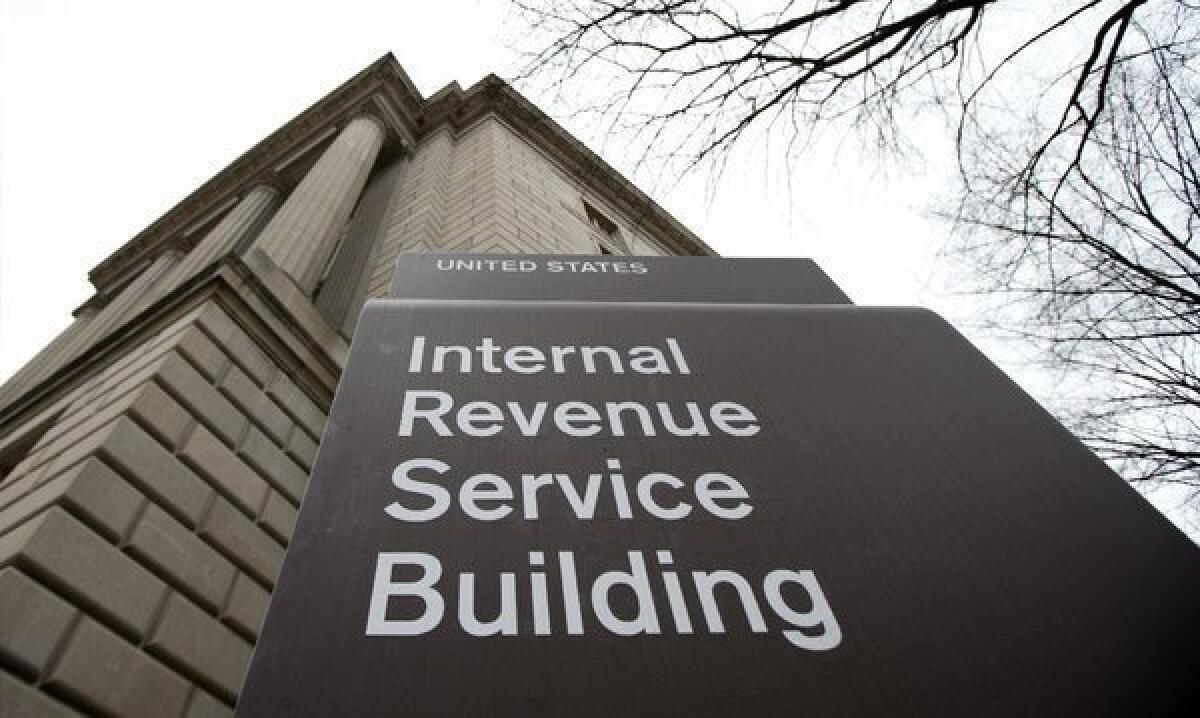IRS will pay whistle-blowers less because of federal budget cuts

- Share via
WASHINGTON -- The federal government’s automatic budget cuts mean there will be less financial incentive to turn in tax cheats.
In a notice on its website, the Internal Revenue Service said it would pay 8.7% less to informants who blow the whistle on tax-dodging individuals or corporations.
The payments are being reduced because of the spending reductions required by the across-the-board cuts known as sequestration that kicked in Friday, the IRS said.
QUIZ: How much do you know about the federal budget cuts?
The IRS pays bounties that can be as much as 30% of the taxes, penalties and interest the agency collects in the case. The office said it pursues information on significant tax-dodging, with higher payments for cases involving more than $2 million in unpaid taxes.
In one of the largest whistleblower awards in U.S. history, the IRS paid $104 million to convicted financier Bradley Birkenfeld last year for informing on thousands of former clients.
The IRS says it paid 128 whistle-blower awards totaling $125.4 million in the 2012 fiscal year. The agency collected $592.5 million in those cases, meaning the awards amounted to 21.2% of the money collected.
For the rest of 2013, the IRS says it will calculate how much money would have been paid to an informant under the previous rules, then reduce the amount by 8.7%.
Under the automatic budget cuts, the IRS’ $125-million informant payment budget for the rest of this fiscal year will be reduced by $6 million, according to the White House Office of Management and Budget.
The whistle-blower payment cut, along with other reductions at the IRS, would lead to “fewer tax return reviews” and “a reduced capacity to detect and prevent fraud,” then-acting Treasury Secretary Neal S. Wolin wrote to Senate Appropriations Committee Chairwoman Barbara Mikulski last month.
“In recent years, each dollar spent on the IRS has returned at least $4 in additional enforcement revenue,” Wolin said. “Thus, each dollar the sequester cuts from current IRS operations would cause a net increase to the deficit, as the lost and foregone revenue would exceed the spending reduction.”
Sen. Charles Grassley (R-Iowa), an advocate of whistle-blowers who has been critical of the IRS program, said Tuesday he had questions about the decision to reduce the payments and wanted a detailed explanation from the Obama administration.
“The whistle-blower payments are made by the IRS, but the proceeds come from companies and individuals who committed tax fraud,” Grassley said. “What’s the legal rationale for cutting the whistle-blower payments? “
Grassley wondered if the decision was being made subjectively.
“Whistle-blowers expose fraud against the government for taxpayer benefit,” he said. “Any step that undermines them is a blow to taxpayers.”
IRS employees also face furloughs because of the cuts. But acting IRS Commissioner Steven T. Miller told his employees last week that furloughs would not begin until the summer, after tax-filing season.
ALSO:
IRS delays issuing tax refunds; fiscal cliff to blame?
Convicted felon gets $104-million whistle-blower reward
Nearly 9 in 10 Americans say it’s not acceptable to cheat on taxes
More to Read
Inside the business of entertainment
The Wide Shot brings you news, analysis and insights on everything from streaming wars to production — and what it all means for the future.
You may occasionally receive promotional content from the Los Angeles Times.











